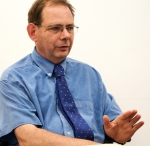Martin Stott
As the only city to hold a mayoral referendum last May and vote in favour, Bristol confirmed its reputation as a city that marches to the beat of a different drum. The mayoral election in November reinforced this maverick status with electors decisively (albeit on a turnout of only 27.9%) electing Independent candidate George Ferguson as Mayor.
The idea of elected mayors has been around for over a decade, one imported uncritically from the US and grafted onto the existing system of local government here. Catherine Durose in her blog ‘Elected mayors: the wrong solution to the wrong problem’ argues that seeing elected mayors as the solution to the ‘democratic deficit’ is wrong. It certainly hasn’t fired up voters, with nine out of the ten cities conducting referenda in May rejecting them – as they did when asked during earlier attempts by New Labour to introduce the concept outside London.
Durose is right in observing that almost all the elected mayors that do exist are already mainstream politicians (ex-MPs or council leaders) and this makes Bristol’s choice more interesting. George Ferguson is a colourful architect and entrepreneur with a track record in making things happen, including the Tobacco Factory in Southville, a multi-use regeneration project that includes café, bistro, apartments and a theatre. Despite his history a Liberal Democrat – he only resigned from the party in May – Ferguson stood as an Independent and won decisively, beating the favourite, Labour’s Marvin Rees, by 37,353 (54.4%) to 31,259 (46.6%) on the second round. He also led by a substantial margin in the first round.
One of the interesting aspects of the result is just how badly the three main parties did, obtaining between them, just 45% of the vote in the first round. The Bristol Post described Ferguson as making ‘mincemeat of the three major parties’. While this appears to be true, it is also a reflection of the profound disconnect between party politics and the voter, expressed nationally in the very low turnout for Police and Crime Commissioners on the same day – as does the election of 12 independent candidates as PCCs.
In Bristol, Labour claimed afterwards that Ferguson won because the Tory and Lib Dem vote collapsed. This is partly true – neither of them even managed 10%, but it begs questions about Labour’s ability to connect with and energise voters too. There was a distinct split across the city in terms of turn out, with relatively high percentages in middle class areas like Henlease (43%), Clifton, Redland, Bishopston, Windmill Hill and Westbury-on-Trym but really poor turn outs in Labour strongholds like Southmead, St George, Filwood and Hartcliffe (11%). The result of the mayoral election may have been important to the Labour Party, but its voters don’t seem to have agreed.
Four days before the vote, Ferguson held an ‘Independents gathering’ in the Tobacco Factory theatre. The audience, numbering well over 100, was surprisingly large for a Monday afternoon event. With him on the stage were Independent veteran ex-MP Martin Bell, independent candidates from Liverpool and London and Independent PCC candidate for Avon and Somerset Sue Mountstevens. Bell, though very supportive, clearly thought that like the Liverpool and London independents, Ferguson and Mountstevens were going to be another pair of plucky losers. By the end of the week both had won, Mountstevens with the largest PCC mandate in the country, and Ferguson humiliating all the mainstream political parties. We may yet record that ‘the march of the independents’ started out in Bristol.
Martin Stott was Head of Environment and Resources at Warwickshire County Council until the autumn of 2011, when he concluded a 25 year career in local government. He has recently become an INLOGOV Associate.
